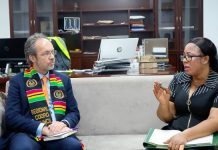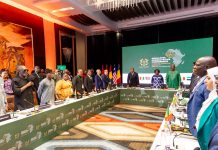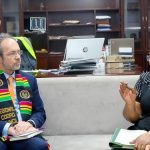Dr. Hassan Ayariga, leader of the All People’s Congress (APC), has presented an ambitious vision for Ghana’s economic future in the party’s newly launched manifesto, unveiled at the University of Professional Studies, Accra (UPSA) auditorium on September 21.

Titled “The Nation’s Manifesto,” the plan outlines a series of policies aimed at transforming Ghana into a 24-hour economy, generating sustainable jobs, and enhancing the living standards of Ghanaians through wage restructuring and innovative economic reforms.
24-Hour Economy and Three-Shift System
A key proposal in Ayariga’s manifesto is the establishment of a 24-hour economy, aimed at implementing a three-shift work system across essential sectors to maximize productivity around the clock.
This initiative is designed to enhance economic output and create more job opportunities for Ghanaians.
Ayariga stated that this initiative will not only enhance economic output but also create millions of jobs for Ghanaians. He noted that, given the scale of the proposed system, Ghana might need to recruit workers from neighboring countries to meet the workforce demand.
“Our vision for a 24-hour economy will ensure a more productive nation both day and night, creating sustainable jobs and driving economic growth,” Ayariga emphasized. “We may even need to bring in workers from neighboring countries to sustain the demand.”
Bi-Weekly Salary Structure and Minimum Wage Reform
As part of his vision to enhance worker welfare, Ayariga proposed a bi-weekly salary structure to provide employees with more frequent and stable income.
In a landmark move, he committed to raising the minimum public sector salary to GHS 5,000 per month and restructuring wages for industrial workers.
Ayariga also pledged to review the minimum daily wage, suggesting an increase from the current GHS 18.15 to between GHS 150 and GHS 300.
“Our plan includes a complete restructuring of salaries across key sectors, ensuring that no Ghanaian is left behind,” Ayariga declared. “We are committed to making GHS 5,000 the baseline for public sector wages.”
Job Creation Through Nationwide Job Centers
Job creation is central to Ayariga’s manifesto, which includes plans to establish job centers in every district across the country.
These centers will connect job seekers with employers and provide essential training and support services.
They will focus on job creation through various channels, including the industrial revolution, manufacturing, mining, construction, and the proposed 24-hour economy.
“We will create a network of job centers that will not only link job seekers to employers but also provide training to improve their employability,” Ayariga stated. “Our focus on industrialization, manufacturing, and production will be key drivers of job creation.”
Duty-Free Port Access and Tax Reforms
To stimulate growth in the production, manufacturing, and industrial sectors, Ayariga pledged to offer duty-free port access and eliminate taxes on imported raw materials. This initiative aims to reduce production costs and encourage local industries to thrive, positioning Ghana as a competitive player in global markets.
“Our plan to remove taxes on imported raw materials and provide duty-free port access will drive industrial growth and lower costs for businesses, ensuring that Ghana can compete on the global stage,” he noted.
Comprehensive Economic Reforms
The manifesto also outlines a range of economic reforms, including a review of the Ghana Labour Act 2003 (Act 651) to protect workers’ rights and establish an efficient payroll system for timely salary disbursements.
Ayariga emphasized the need to monitor and adjust conditions of service for all workers to maintain fairness and productivity.
Through these initiatives, Dr. Hassan Ayariga’s manifesto aims to usher in a new era of economic growth, job creation, and improved living standards for all Ghanaians.
His vision reflects a commitment to industrialization, fair wages, and building a self-reliant economy that prioritizes the needs of its citizens.
With a strong focus on innovation, industrial growth, and job creation, Ayariga’s “Nation’s Manifesto” serves as a comprehensive roadmap for transforming Ghana’s economy and securing a brighter future for its people.
























































![[FREE FREE MONEY] Predict and Win a Guaranteed GH¢200 From Us EVERY WEEK](https://wordpress.ghanatalksradio.com/wp-content/uploads/2022/02/Predict-and-Win-Final-09-03-2021-218x150.jpg)
![[Predict & Win – 8th/Oct.] WIN A Guaranteed ¢200 From Us This Week](https://wordpress.ghanatalksradio.com/wp-content/uploads/2021/10/maxresdefault-16-218x150.jpg)
![[Predict & Win – 2nd] WIN A Guaranteed ¢200 From Us This Week](https://wordpress.ghanatalksradio.com/wp-content/uploads/2021/09/maxresdefault-50-218x150.jpg)
![[Predict & Win – 25th] WIN A Guaranteed ¢200 From Us This Week](https://wordpress.ghanatalksradio.com/wp-content/uploads/2021/09/maxresdefault-36-218x150.jpg)
![[Predict & Win – 18th] WIN A Guaranteed ¢200 From Us This Week](https://wordpress.ghanatalksradio.com/wp-content/uploads/2021/09/maxresdefault-23-218x150.jpg)









![[National cathedral] See full list of churches that have contributed since 2018](https://wordpress.ghanatalksradio.com/wp-content/uploads/2020/09/Ghana-National-Cathedral-GhanaTalksRadio-100x70.jpg)

![[Ejisu NPP Primary] Vitus Azeem tells Kwasi Nyantakyi not to contest if he has conscience](https://wordpress.ghanatalksradio.com/wp-content/uploads/2024/04/Kqwesi-100x70.jpg)
![[By-election] Assin North voters to appoint new MP tomorrow](https://wordpress.ghanatalksradio.com/wp-content/uploads/2023/06/candidates-100x70.jpg)
